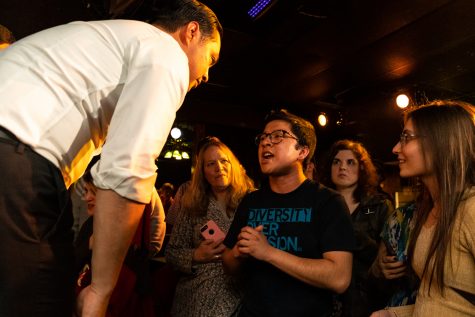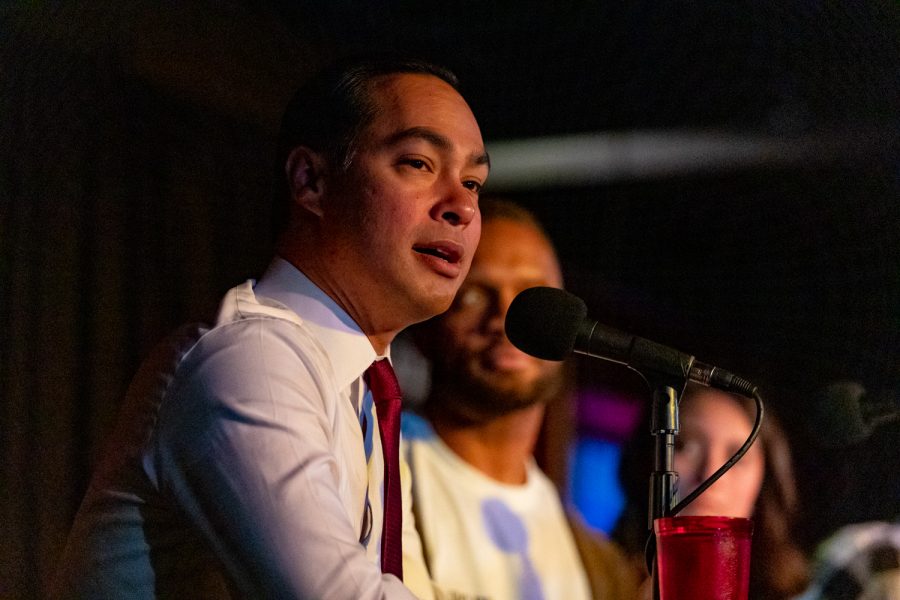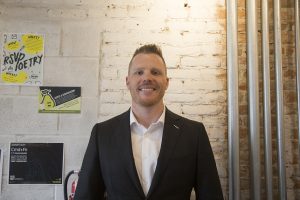Julián Castro talks immigration, health care during podcast appearance in Iowa City
Former member of President Obama’s cabinet Julián Castro made his first official Iowa City stop as a guest on the Iowa-based Political Party Live podcast, which was recorded in front of a live audience at the Mill.
Julian Castro, former Secretary of Housing and Urban Development and current Democratic candidate for president appears on the Political Party Live podcast at The Mill on Sunday, Apr. 14, 2019.
April 14, 2019
On Sunday, Julián Castro was the fourth presidential candidate to sit down with the hosts of the Iowa-based Political Party Live podcast, where he discussed a variety of policy topics and why voters should support him in front of a live audience of around 100 people.
Before the podcast recording, Castro sat down with The Daily Iowan and discussed his policy platform and his campaign strategy.
He said his executive experience as the Housing and Urban Development secretary and the mayor of San Antonio is one way he stands out among a packed field of candidates. Castro served in former President Barack Obama’s Cabinet as the Housing and Urban Development head from 2014 to 2017. Before that, he served as the mayor of San Antonio from 2009 to 2014.
As HUD secretary, Castro said, he was able to travel across the country to discuss issues facing Americans such as housing, educational achievement, and poverty.
“I saw the way the communities were not only grappling with housing issues but with everything connected to that,” Castro said in an interview with the DI.
RELATED: Photos: Julián Castro at the Mill
Castro said his vision for the country is to make the U.S. the smartest, healthiest, fairest, and prosperous nation in the world through immigration, health care, and education reforms.
On immigration Castro proposed a “people first” immigration plan that would include increasing the number of refugees the U.S. accepts each year, creating an immigration judiciary system to process claims, and a “21st Century Marshall Plan” that would help citizens of Central American countries to find safety and opportunity at home.

Julian Castro, former Secretary of Housing and Urban Development and current Democratic candidate for president talks with a supporter at The Mill after appearing on the Political Party Live podcas ton Sunday, Apr. 14, 2019.
Catherine Basile, a Cedar Rapids resident at Sunday night’s event, said his immigration plan is part of the reason she is impressed by Castro, adding that she is a fan of both Castro and his twin brother, Joaquin.
“Both of the Castro brothers are impressive young men,” she said.
In the 2020 election, she said, education will be one of the most important issues for her.
Tuition-free public universities, community colleges, and other apprenticeship and certification programs is the centerpiece of Castro’s plan to ensure everyone has access to postsecondary education or training. He also wants to address student-loan debt through finding ways for borrowers to refinance their debt, he said.
To address health-care costs, Castro said, he wanted to undo what he has characterized as sabotage of the Affordable Care Act and move toward a Medicare for all option.
More specifics for his plan will be released before the caucuses, he said, including how it will be paid for. Repealing tax cuts to wealthy corporations and individuals and finding other revenue streams would be part of the equation, he said.
“Ultimately, people should have access to Medicare, and we’re going to find the revenue that we need within the system that exists now,” Castro said.
Castro was born and raised in San Antonio with mother Rosie and Joaquin, who currently represents Texas in the U.S. House of Representatives. Grandmother Victoria immigrated to the U.S. when she was 7.
Lilián Sánchez, a guest co-host of the podcast and former vice president of University of Iowa Student Government, said she appreciated Castro’s message of positivity and compassion that he brings to his campaign and into his policymaking
“He’s very cognizant of a lot of the identities that exist within politics and how ultimately he can have a very intersectional perspective in finding reform in any issue,” Sánchez said.






